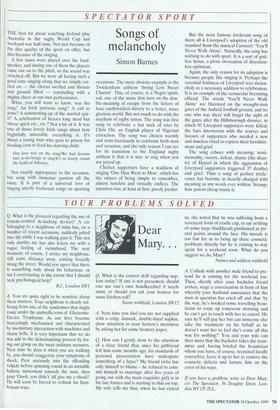SPECTATOR SPORT
Songs of melancholy
Simon Barnes
THE best bit about watching Ireland play Australia in the rugby World Cup last weekend was half-time. Not just because of the dire quality of the sport on offer, but also because of the singing.
A few tunes were played over the loud- speaker, and during one of them the players came out on to the pitch, so the sound was switched off. But we were all having such a good time singing along that we simply car- ried on — the chorus swelled and throats and ground filled — concluding with a mighty cheer at our own performance.
What, you will want to know, was the song? An Irish patriotic song? A call to arms? A summoning-up of the martial spir- it? A celebration of heroes long dead but whose spirit etc., etc.? Not a bit of it. It was one of those lovely Irish songs about how frightfully miserable everything is. It's about a young man who goes to prison for stealing corn to feed his starving child:
Our love was on the wing/We had dreams and so-ho-hongs to sing/It's so lonely round the fields of Athenry.
Not exactly appropriate to the occasion, but sung with immense passion all the same. It is part of a universal love of singing utterly irrelevant songs on sporting occasions. The most obvious example is the Twickenham anthem 'Swing Low Sweet Chariot'. This, of course, is a Negro spirit- ual, one of the many that turn on the dou- ble-meaning of escape from the fetters of base earth/wicked slavery to a better, more glorious world. But not much to do with the mayhem of rugby union. The song was first sung to celebrate a hat trick of tries by Chris Oti, an English player of Nigerian extraction. The song was chosen warmly and semi-facetiously to celebrate both man and occasion, and the only reason I can see for its transition to the England rugby anthem is that it is nice to sing when you are jarred up.
Chelsea supporters have a tradition of singing 'One Man Went to Mow', which has the virtues of being simple to remember, almost tuneless and virtually endless. The intention was, at least at first, purely jocular. But the most famous irrelevant song of them all is Liverpool's adoption of the old standard from the musical Carousel: 'You'll Never Walk Alone'. Naturally, the song has nothing to do with sport. It is a sort of god- less hymn, a pious invocation of direction- less optimism.
Again, the only reason for its adoption is because people like singing it. Perhaps the essential Irishness of Liverpool sees melan- choly as a necessary addition to celebration. It is an example of the vernacular becoming official. The words 'You'll Never Walk Alone' are blazoned on the wrought-iron gates of the Anfield football ground, and no one who was there will forget the sight of the gates after the Hillsborough disaster, in which 95 Liverpool supporters were killed; the bars interwoven with the scarves and favours of supporters who needed a new and timeless ritual to express their bewilder- ment and grief.
The song echoes with meaning: senti- mentality, victory, defeat, shame (the disas- ter of Heysel in which the aggression of Liverpool supporters triggered 37 deaths) and grief. Thus a song of perfect irrele- vance has become as heavily charged with meaning as any words ever written. Strange how potent cheap music is.


















































































 Previous page
Previous page